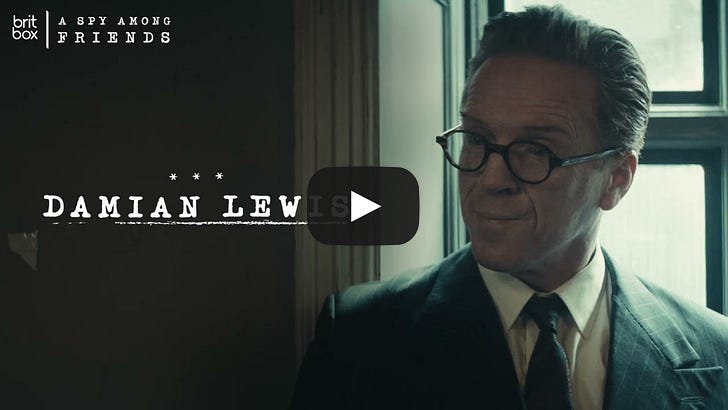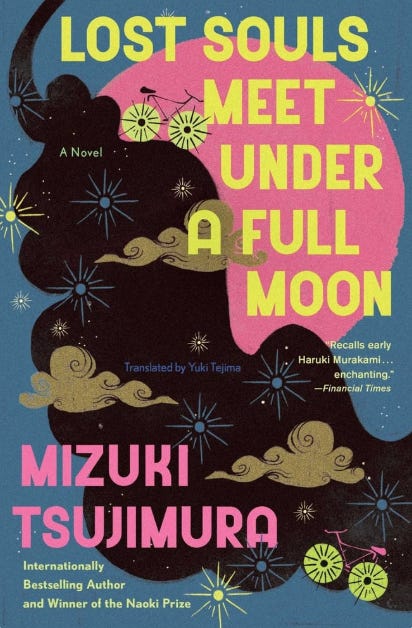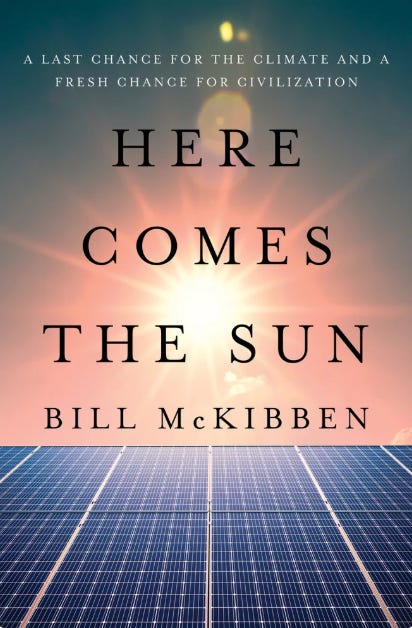Hello Genius—It's Your End of Summer Wag!For Labor Day Weekend: Spies, Sleuths, Ghosts, Grifters, Roses—and the One and Only David ByrneTo betray, you must first belong. I never belonged. Dear Wags, We see traitors everywhere these days. A crime that once carried the maximum penalty is now reflexively hurled at political opponents as though it carried no weight at all. If you attach no particular importance to treason, you diminish nationhood and patriotism, too. Lazy language—the modern habit of turning the worst charge into another digital triviality—strips words of their meaning. If the only thing that matters is acting in your own self-interest, the betrayal of one’s country is hardly a crime at all. Treason becomes just another way to get ahead. This is a treasonous historical moment, defined by venality and ego. A few podcasters may wrestle with big ideas, but our societies are driven by cartoonish emotion. Accruing advantage, as a defining personal value, has become an operational goal of states. China, Russia, and the United States are not engaged in a grand ideological struggle but in a tussle for leverage that serves their leaders’ avarice rather than national interests. The twentieth century, fading in the rearview, really was as much defined by the clash of philosophies as by the grubby acquisition of stuff. Harold Adrian Russell Philby was one of its warriors: a charming man and an unapologetic traitor. To his many friends, he was Kim, after the boy spy in Rudyard Kipling’s 1901 novel; disguised as a street urchin, the character foils Russian efforts to undermine the British Raj in the Great Game. His Janus-like namesake did just the opposite, working for the Russians to sabotage British and American interests. He died on May 11, 1988, in Moscow, a decorated hero of the Soviet Union. The firm Philby served collapsed a little more than three years later. In wintry exile, he remained an Englishman at heart, avidly following cricket on the often-jammed BBC World Service, reading smuggled British newspapers, wearing his public school scarf, and drinking contraband whisky from home. He was a product of the Empire he loathed: born in Punjab, tormented by a withholding father, flogged in prep school, only fleetingly liberated by drink. These aspects of national character were hardwired, but he chose to serve a rival concern. Even so, his paranoid Soviet minders never fully trusted him—the tax paid by all double agents. Philby was the greatest—and most reviled—spy in history, rising through British counterintelligence at the height of the Cold War and winning trust deep inside the British and American security apparatus, all while funneling secrets to Moscow. He sabotaged Anglo-American espionage operations for two decades before he was finally exposed in 1963. At the time, Philby was working as a journalist (and MI6 operative) in Beirut. He fled to Russia on the freighter Dolmatova after being confronted by his close friend and fellow officer Nicholas Elliott. That compromised relationship was at the center of Ben Macintyre’s 2015 bestseller A Spy Among Friends and its murky 2022 adaptation—mostly overlooked on first release, now coming in from the cold on BritBox.  Philby and fellow travelers Donald Maclean, Guy Burgess, Anthony Blunt, and John Cairncross—the so-called Cambridge Five—have inspired a vast array of books, television shows, and films. Alexander Cary’s reworking of Macintyre’s story plays fast and loose with the facts and is rather stingy on fun (it’s hard to see how Guy Pearce’s glum Philby beguiled so many people). Still, it captures the scope of his betrayal. MI6 toffs like Elliott (Damian Lewis) simply could not believe that a member of their club—actually, many exclusive clubs—could so thoroughly reject their values. It was a lethal blow to that establishment, one that cemented Britain’s junior status in its partnership with the United States. Cary goes a bit far in hinting that Philby might have turned again after being caught, coughing up Blunt, an acclaimed art historian and Surveyor of the Queen’s Pictures (Blunt secretly confessed in 1964 but wasn’t publicly exposed until 1979). Elliott did want to torment Philby after his defection by planting a story suggesting he was a triple agent. MI6 didn’t go for it. Still, Philby’s escape before he could face British justice was awfully convenient. He had been publicly accused years earlier, in 1955, when he was linked to Maclean and Burgess, who had defected to Moscow in 1951. He denied the charges, even holding a press conference in which he protested his innocence. It was a bravura performance, one still cited by intelligence agencies as a textbook case of how a spy can dissemble. Prime Minister Anthony Eden’s government backed him, as did his old MI6 chums and James Jesus Angleton, the CIA’s top counterintelligence specialist. Philby’s early communism was no secret—treated by MI6 and the clubmen of his class as a mere youthful lapse. He was excused again and again until the enormity of his duplicity could no longer be ignored. Even when his fast track to the top was derailed, he was quietly ushered back into intelligence work—where he inflicted further damage on the West. In a 1967 interview with Australian journalist Murray Sayle, Philby styled himself a born outsider. In truth, he was the ultimate inside man. Philby later wondered if Elliott and MI6 had let him slip the noose to spare themselves deeper embarrassment—and to keep him from falling into American hands, since Washington was furious at Britain’s failure. The idea is plausible, given the scale of the humiliation. A graduate of Westminster School and Cambridge, and the son of the eccentric Arabist St. John Philby, the mole seemed beyond reproach to his colleagues (though the less aristocratic MI5 men were onto him much sooner). He did more than let down the side: in two decades of conniving against his own government, Philby was responsible for the deaths of hundreds—if not thousands—of Western agents and anti-communist partisans in Eastern Europe. And he was not sorry. “To the extent that I helped defeat them, even if it caused their deaths, I have no regrets,” he said of the anti-communist Albanians he betrayed to Enver Hoxha’s regime. “I look back on my life as given to the service of a cause that I sincerely and passionately believe is right.” Philby was profoundly wrong. As a young man, he came to believe communism was the only force capable of stopping Hitler, and he was recruited by the NKVD at Cambridge in the 1930s, when fascism menaced Europe. “I already had a deep emotional connection to the weak, poor, and less privileged compared to the strong, rich, and arrogant," he later wrote. Still, the rigidity of his loyalties in the years that followed is staggering. He stood by the Soviet Union even after Stalin’s purges consumed his first handlers, willfully blind to a regime that had destroyed them—and millions more besides. When Stalin signed the Molotov–Ribbentrop Pact with Hitler in 1939, Philby remained loyal, just as he did when the Soviets joined the Allies. The USSR’s colonization of Eastern Europe and the murders of Nazi opponents who were also anti-communists did nothing to shake him. The friends he cultivated, two of his four wives, and the four children he doted on were all part of an elaborate cover story. “I am really two people. I am a private person and a political person,” he said. “Of course, if there is a conflict, the political person comes first.” Philby’s plummy joie de vivre was deployed in the service of a ruthless agenda. He hid his first marriage to Austrian Communist spy Litzi Friedmann; he drove his second wife, Aileen Furse—who struggled with mental illness—to an early grave. His third wife, American Eleanor Brewer, learned of his spying only after he had been spirited away to Moscow. After an attempt to reconcile with him in the USSR, she left brokenhearted and died in 1968. “He betrayed many people, myself included,” she wrote in The Spy I Loved, published after her death. By then, Philby had taken up with Maclean’s American wife, Melinda. His last marriage, to Russian memoirist Rufina Pukhova, was shaped by epic drinking. After Philby’s death, Pukhova said he had at last become disillusioned with communism and tried to limit himself to two glasses of cognac a night, giving her the rest of the bottle to hide. “His alcoholism was suicide," she told a Russian newspaper. "He once even said that it was the easiest way to bring life to an end." But who can be sure of anything he said? Philby had a long run as a master deceiver. The lone consistency in his life was fealty to an ideology that spectacularly came apart. He was so committed to Stalinism that, after Cambridge, he first posed as a Nazi sympathizer, then adopted the cover of a journalist in the Spanish Civil War. His sympathetic reports on rightist forces even won him a commendation from Francisco Franco. If he later felt let down by Glasnost, it is unlikely he dreamed of running back into Her Majesty’s arms. Unlike so many modern betrayals, his weren’t about wealth or fame. Philby clung instead to a warped sense of justice. His crimes were those of a diehard, but they were enabled by the impeccable manners of an English gentleman, raised to hoard secrets and shield sincerity behind a stammer, an arched eyebrow, or an ironic joke. His friend Elliott never recovered. “He had charm to burn,” he reflected after Philby’s defection. “He is said to have it still.” What do today’s great deceivers deploy guile for—if not merely power lust and revenge? Philby would no doubt have condemned the decadence of Trump’s America, but reconciling himself to the corruption of Putin’s Russia would have been harder. He spent his last years in a Moscow apartment—luxurious only by the standards of a failing communist state—under constant watch from East and West. He dulled the pain with liquor, as Elliott cattily observed, “among dreary people, a spying servant, [in] drab clothes…for a creed that is now thoroughly discredited.” At least he had a self-justifying myth, one that had captivated him in youth: “If I had a chance, I would do it all again. I would do it exactly the same way.” It was misguided to think the best way to help the downtrodden was to serve totalitarianism. It was infinitely worse to persist after the full scope of Soviet brutality was known. Yet Philby was not another hack for despots; he was a true believer in an ill-starred cause. For all his lies, his wife Eleanor still recognized a traitor’s courage. “No one,” she wrote, “can ever really know another human being.” Yours Ever, Lost Souls Meet Under a Full Moon by Mizuki Tsujimura, translated by Yuki Tejima Tsujimura’s dreamy novel about the afterlife was a Japanese bestseller. Now it’s available in elegant translation—a spare, touching story about a go-between who arranges reunions between the living and the dead. Ayumi, a teenager who knits together those worlds, has strict rules for such encounters: the fickle dead can decline an invitation from those they left behind, the meeting must take place during a full moon, and it can only happen once. His living clients have complex reasons for arranging to see their lost loved ones. There’s a grasping son who wants to ask his late mother about a piece of family property, a businessman stricken by his fiancée’s sudden disappearance, and a young woman convinced she caused her friend’s death. The work takes its toll on Ayumi, whose vocation is less about channeling the supernatural than an endless negotiation with grief. This is a strange, lyrical fantasy as well as a thought-provoking meditation on loss. —Cole Sear Here Comes the Sun by Bill McKibben McKibben’s latest environmental call to action has a decidedly hopeful title. By echoing the Beatles’ sunny anthem, he signals that despair is not the only response to climate change. Instead, the acclaimed writer and activist (The End of Nature) reframes the conversation: the planet is heating up, but there is an extraordinary opportunity to harness solar power to reduce the damage to ecosystems and civilization. America may be backsliding toward the internal combustion engine, but McKibben sees the accelerating shift toward renewables as a beam of hope. Fossil fuel giants will resist any erosion of their market share, but the possibilities outlined here feel, for once, uncharacteristically bright. —Mark Watney ... Continue reading this post for free in the Substack app |
Hello Genius—It's Your End of Summer Wag!
17:17
0











